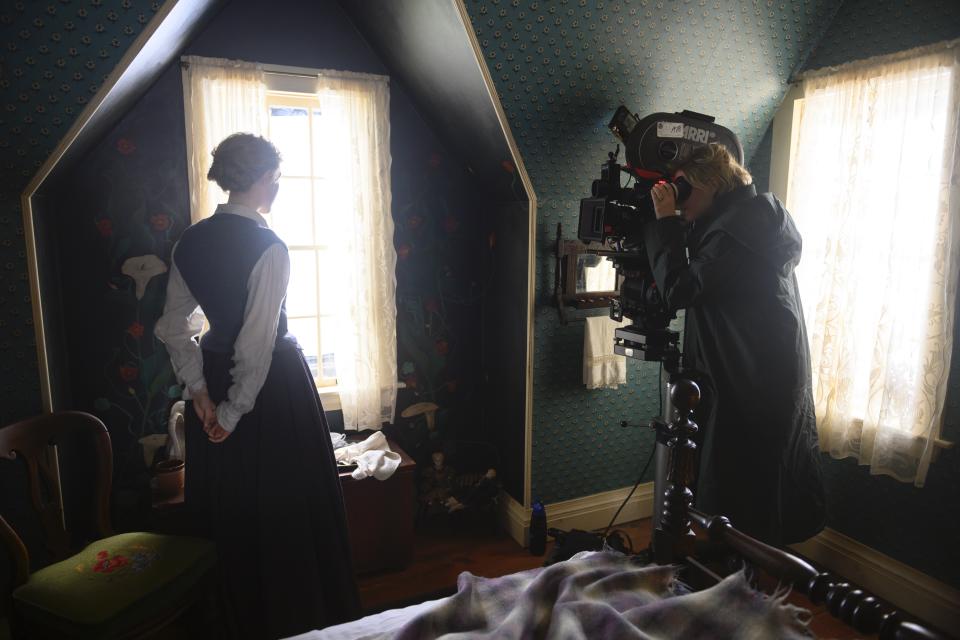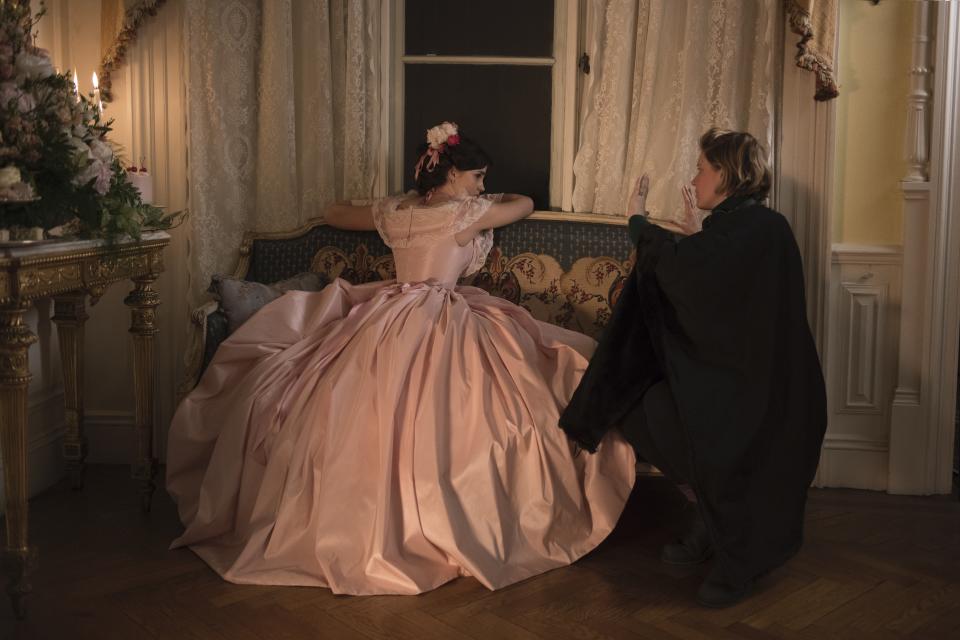'Little Women' director Greta Gerwig responds to her 'bummer' Golden Globes snub: 'It's nice to be recognized'

Two years ago, Natalie Portman made headlines — and put awards season on notice — when she called out the Golden Globes and the Hollywood Foreign Press Association for the lack of female nominees in the Best Director category. Standing next to three-time Golden Globe directing nominee Ron Howard, the actress pointedly said, “Here are the all-male nominees,” inspiring gasps and applause in the room. Sadly, Portman’s mic-drop moment didn’t inspire the HFPA to change their ways. History repeated itself at last year’s ceremony, and when the 77th Golden Globes are handed out on Sunday, Jan. 5, the Best Director category is, once again, a boys’ club. (The last female filmmaker to receive a nomination was Ava DuVernay in 2014.)
Since the nominations were announced on Dec. 9, social media and awards watchers have listed the many female directors whose work was snubbed by the Globes, and one name that comes up over and over again is Greta Gerwig, the writer and director of the new adaptation of Louisa May Alcott’s 19th century classic Little Women, featuring the sterling ensemble of Saoirse Ronan, Florence Pugh, Emma Watson and Eliza Scanlen as the titular March women. Not coincidentally, the filmmaker was also overlooked by the HFPA for her breakthrough 2017 feature, Lady Bird, which was almost certainly one of the omitted films on Portman’s mind when she made her remarks.
Video: ‘Little Women’ Trailer
When it opened in theaters on Christmas Day, Little Women had already received rave reviews and appeared on multiple year-end “Best Movies of 2019” lists, including our own. Audiences have embraced the film as well: Little Women earned more than $40 million over the holiday break, more than holding its own opposite blockbusters like Star Wars: The Rise of Skywalker and Jumanji: The Next Level. With an A-minus Cinemascore rating, the movie will quickly pass Lady Bird’s $48 million gross and could enter $100 million territory by the end of its theatrical run, especially if it receives an Oscar boost when nominations are announced on Jan. 13.
But first up are the Golden Globes, where the film will largely be an observer. (The same goes for the SAG Awards, which will be handed out on Jan. 19; despite the star power of its ensemble, Little Women was completely overlooked by SAG voters.) While Gerwig missed out on a directing nod, the film did receive two Globe nominations, one for Ronan’s terrific lead performance as fledgling author Jo March and another for Alexandre Desplat’s moving score. “I was thrilled that Saoirse and Alexandre got nominated, because they’re so extraordinary and couldn’t deserve it more,” the director tells Yahoo Entertainment.

At the same time, Gerwig admits to some personal disappointment about being overlooked, and sadness about the other female filmmakers whose movies were also shut out. “It’s always a bummer, because of course it’s nice to be recognized. But there was so much beautiful work done this year by women filmmakers — truly extraordinary, groundbreaking work, and I would love to see that recognized. It deserves to be placed there alongside all the other work.”
It’s worth noting that Oscar voters still have a chance to make up for the HFPA’s oversight, just as they did two years ago when Gerwig received a Best Director nomination for Lady Bird. Even if her own name isn’t announced on the morning of Oscar nominations, the director has a list of female-made films she’d love to see recognized, including Portrait of a Lady on Fire, Queen & Slim, The Farewell, Atlantics and Hustlers. “I hope it happens for these films. I think everyone’s trying to figure that out.”
Gerwig also sees reason for hope in this year’s report from the USC Annenberg Inclusion Initiative, which monitors diversity in front of and behind the camera in major Hollywood productions. Founded by Stacy L. Smith, the just-released 2019 study revealed major gains for female directors. 10.6 percent of the directors behind the year’s top-grossing movies were women, the highest percentage in 13 years. “The work’s getting done and it’s getting done on a larger scale than before, which is important,” emphasizes Gerwig. “It’s all going in the right direction. And if people want to give ladies trophies, I am in full support of that!”
But awards chatter is ultimately less important to Gerwig than moviegoers’ enjoyment. Lady Bird proved a big hit with audiences, earning almost $50 million at the domestic box office on a $10 million budget. Little Women is similarly aimed to delight the widest possible crowd, even those unfamiliar with Alcott’s novel or any of the previous big-screen versions. “I really can say, ‘I think you’ll love your time in the movie theater,’” Gerwig tells prospective viewers. “I think it’s a movie that makes you happy, makes you cry and makes you feel warm and achy at the same time. It’s also something that I really hope inspires people. I want them to have this feeling of having gone on this epic journey, and then wanting to write or make their own stories.”
That’s the message that Gerwig took away from Alcott’s book as a young reader, and it informs every story she chooses to tell as an adult. “I’ve been lucky to make movies that are all mine, and are personal and idiosyncratic,” she says, while also noting that that sometimes presents a challenge when she’s pitching to Hollywood executives looking for more of the same. “Everything’s an uphill battle, but I like surprising people and I like needing to win people over. That’s a good place to have to be.”

Gerwig’s own pitch-session experiences inform a pair of scenes that bookend Little Women in which Jo tries to sell a short story and later a completed novel to a gruff male publisher, Mr. Dashwood (played by Tracy Letts), who has some very specific ideas about what she should write. “That opening scene is lifted almost word-for-word from the book, except for the part where Dashwood says, ‘Make sure she’s married or dead by the end.’ That was me. But then at the end, when he’s saying, ‘It’s too long’ and ‘People want to be amused, not preached at,’ that’s all stuff that could have been said to me yesterday, sitting across from a studio head.”
Another aspect of Little Women that’s uniquely Gerwig is the film’s approach to time; instead of recounting Alcott’s story in linear fashion, her screenplay fractures chronology so that we move back and forth between Jo’s past and present. It’s a similar idea — albeit a different structure — to Lady Bird, which unfolds like a senior year high school yearbook, with lots of little moments frozen in time. “That’s how I experience time in general,” Gerwig explains. “At this very moment, I’m about a block from the New York Public Library talking to you, but I’m also remembering the very first time I went there as a college student, and I’m thinking of a picture I have of myself as a little girl standing in front of the library. So my memory is a surge of not just one thing, but a multiplicity of things.”
In the case of Little Women, that approach heightens some of the most emotional moments in Alcott’s narrative, most notably the death of Jo’s sister, Beth (played here by Scanlen), from scarlet fever. In the novel, and most dramatic adaptations, we’re privy to her final moments and her family’s grief. Gerwig’s film, on the other hand, shows us Beth’s initial illness and recovery and then skips over her passing, with only an empty bed signifying her loss. “At that point, I wanted all the timelines to converge, so that you wouldn’t necessarily know whether you were in the past or the present,” she explains. “It’s just that the second time she’s gone. I wanted to capture that sense of ‘But they were just right here,’ and that’s nowhere more vivid than it is in death. That’s how it feels.”
Little Women is now in theaters; visit Fandango for showtime and ticket information.
Read more from Yahoo Entertainment:
Want daily pop culture news delivered to your inbox? Sign up here for Yahoo Entertainment & Lifestyle’s newsletter.



